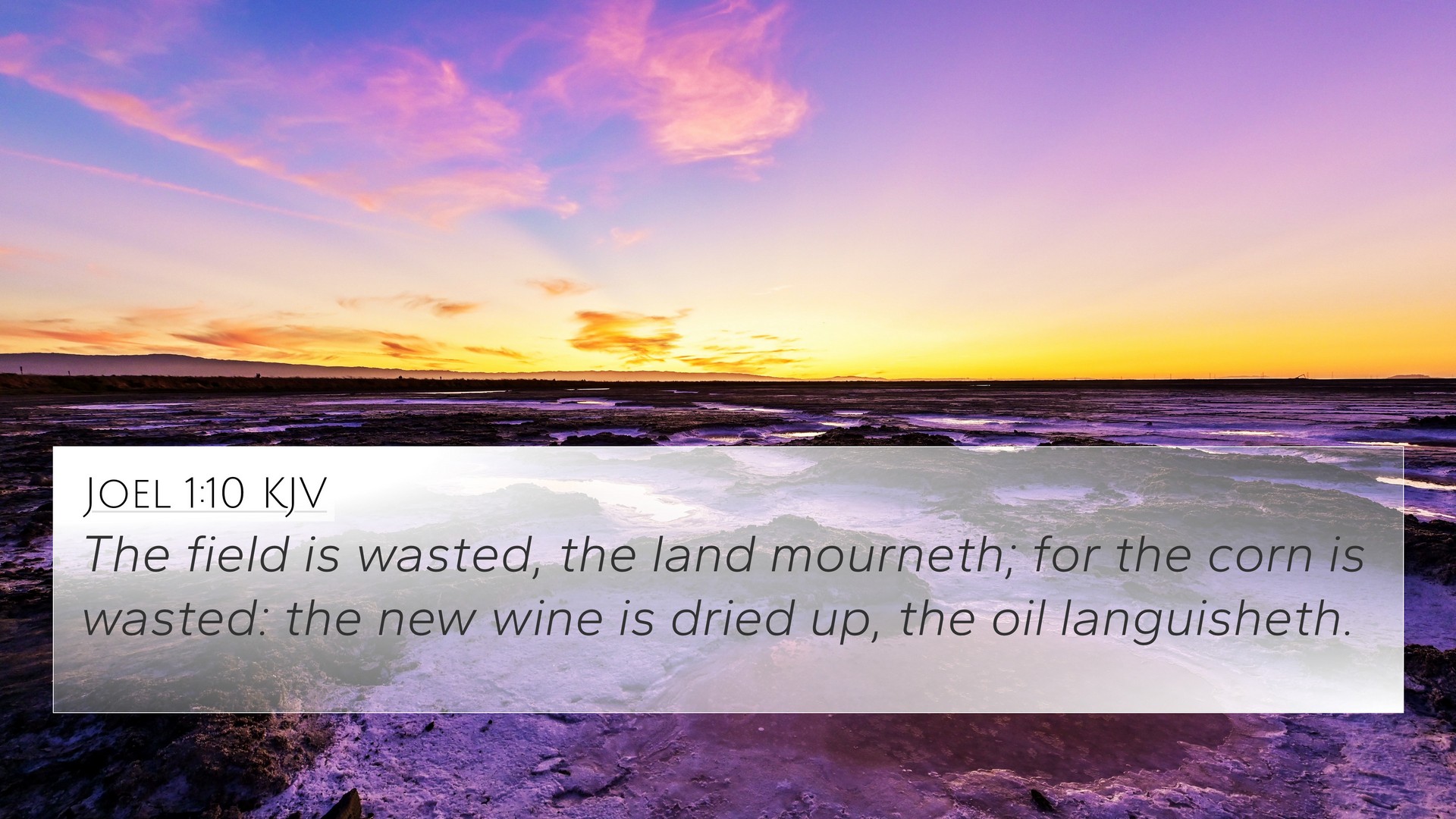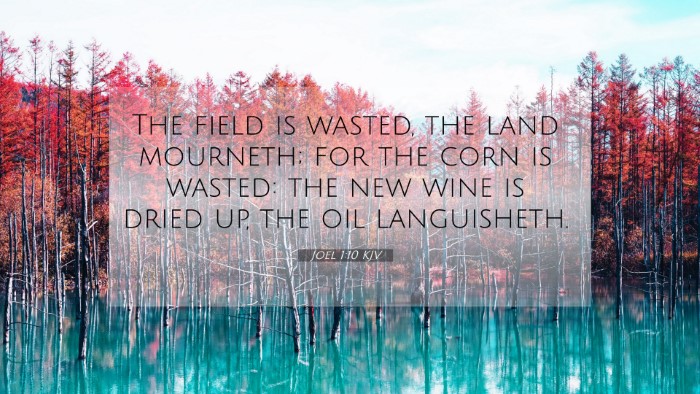Old Testament
Genesis Exodus Leviticus Numbers Deuteronomy Joshua Judges Ruth 1 Samuel 2 Samuel 1 Kings 2 Kings 1 Chronicles 2 Chronicles Ezra Nehemiah Esther Job Psalms Proverbs Ecclesiastes Song of Solomon Isaiah Jeremiah Lamentations Ezekiel Daniel Hosea Joel Amos Obadiah Jonah Micah Nahum Habakkuk Zephaniah Haggai Zechariah MalachiJoel 1:10 Similar Verses
Joel 1:10 Cross References
The field is wasted, the land mourneth; for the corn is wasted: the new wine is dried up, the oil languisheth.
Uncover the Rich Themes and Topics of This Bible Verse
Listed below are the Bible themes associated with Joel 1:10. We invite you to explore each theme to gain deeper insights into the Scriptures.
Joel 1:10 Cross Reference Verses
This section features a detailed cross-reference designed to enrich your understanding of the Scriptures. Below, you will find carefully selected verses that echo the themes and teachings related to Joel 1:10 KJV. Click on any image to explore detailed analyses of related Bible verses and uncover deeper theological insights.

Jeremiah 12:11 (KJV) »
They have made it desolate, and being desolate it mourneth unto me; the whole land is made desolate, because no man layeth it to heart.
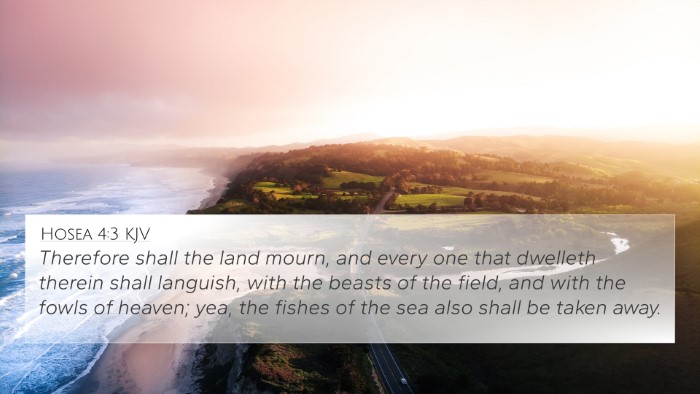
Hosea 4:3 (KJV) »
Therefore shall the land mourn, and every one that dwelleth therein shall languish, with the beasts of the field, and with the fowls of heaven; yea, the fishes of the sea also shall be taken away.
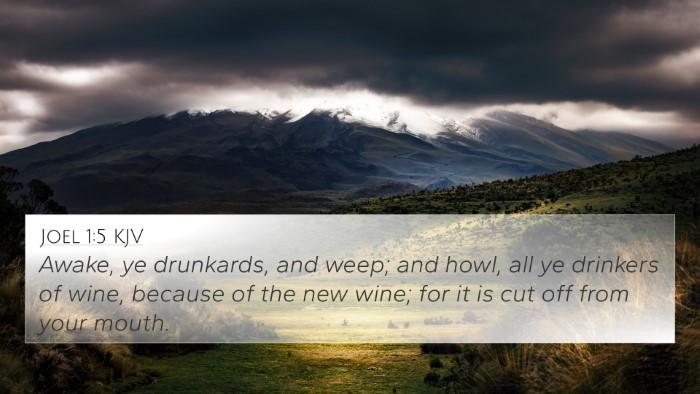
Joel 1:5 (KJV) »
Awake, ye drunkards, and weep; and howl, all ye drinkers of wine, because of the new wine; for it is cut off from your mouth.
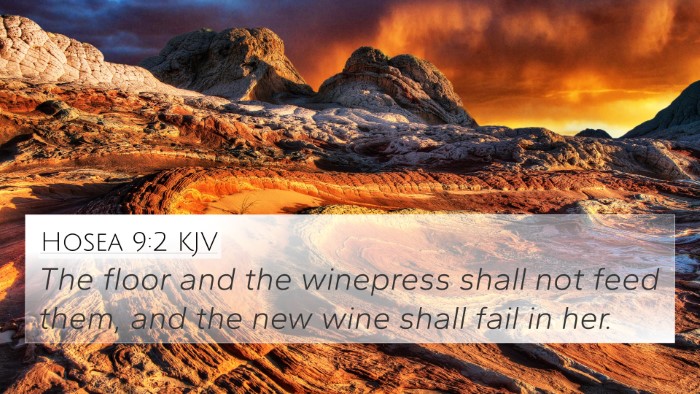
Hosea 9:2 (KJV) »
The floor and the winepress shall not feed them, and the new wine shall fail in her.
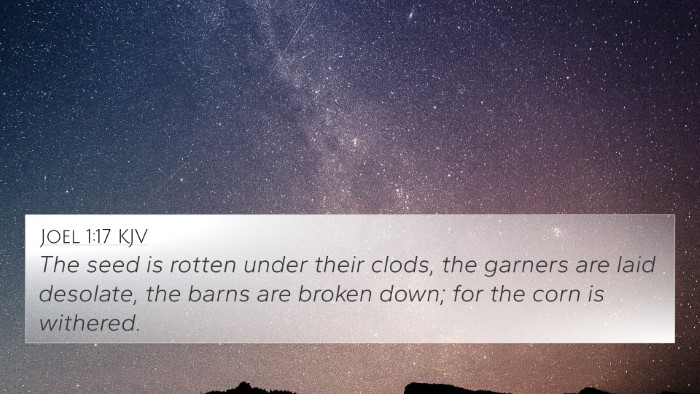
Joel 1:17 (KJV) »
The seed is rotten under their clods, the garners are laid desolate, the barns are broken down; for the corn is withered.
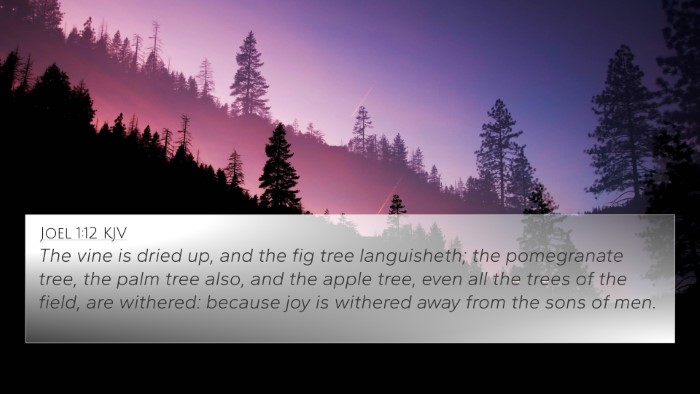
Joel 1:12 (KJV) »
The vine is dried up, and the fig tree languisheth; the pomegranate tree, the palm tree also, and the apple tree, even all the trees of the field, are withered: because joy is withered away from the sons of men.
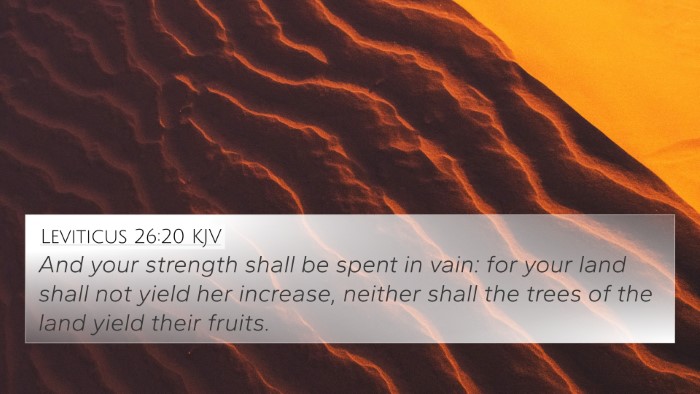
Leviticus 26:20 (KJV) »
And your strength shall be spent in vain: for your land shall not yield her increase, neither shall the trees of the land yield their fruits.
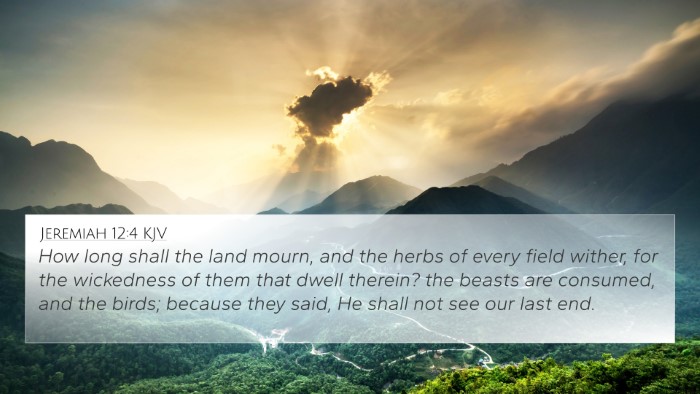
Jeremiah 12:4 (KJV) »
How long shall the land mourn, and the herbs of every field wither, for the wickedness of them that dwell therein? the beasts are consumed, and the birds; because they said, He shall not see our last end.
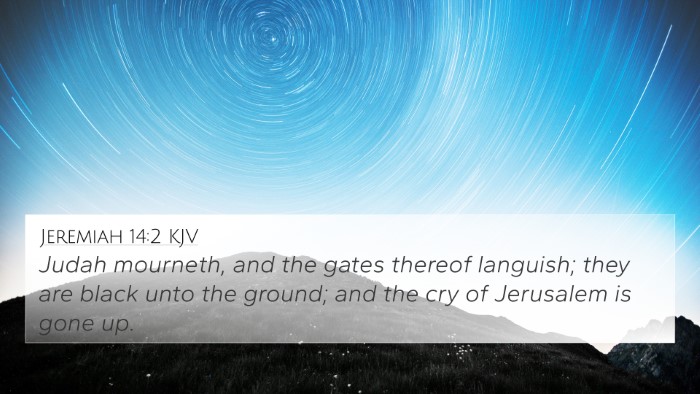
Jeremiah 14:2 (KJV) »
Judah mourneth, and the gates thereof languish; they are black unto the ground; and the cry of Jerusalem is gone up.
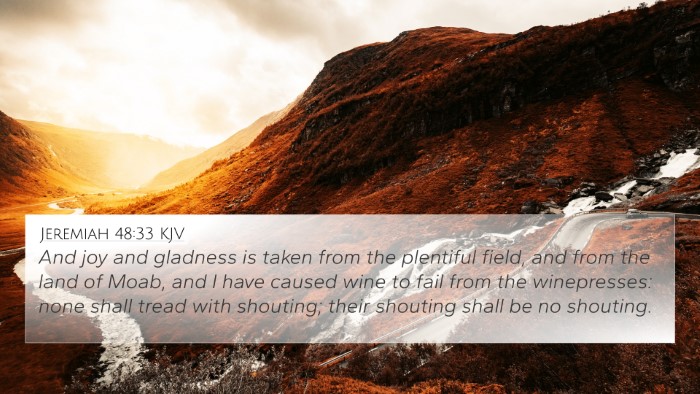
Jeremiah 48:33 (KJV) »
And joy and gladness is taken from the plentiful field, and from the land of Moab, and I have caused wine to fail from the winepresses: none shall tread with shouting; their shouting shall be no shouting.

Isaiah 24:11 (KJV) »
There is a crying for wine in the streets; all joy is darkened, the mirth of the land is gone.
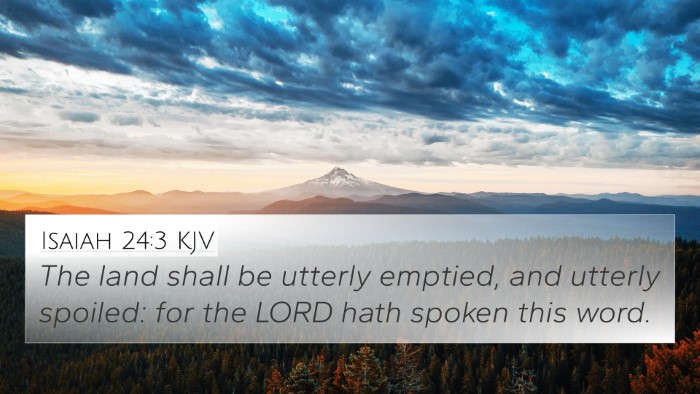
Isaiah 24:3 (KJV) »
The land shall be utterly emptied, and utterly spoiled: for the LORD hath spoken this word.
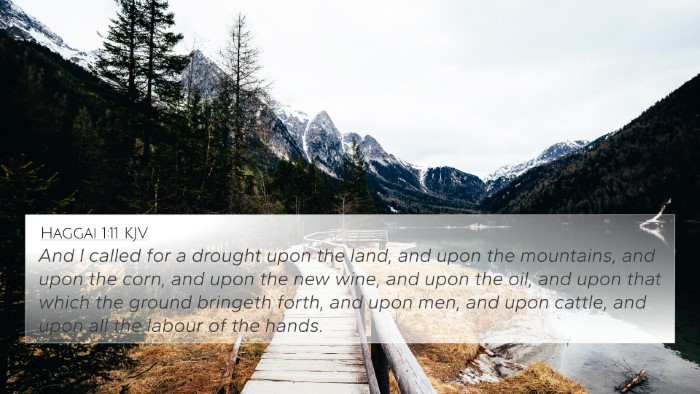
Haggai 1:11 (KJV) »
And I called for a drought upon the land, and upon the mountains, and upon the corn, and upon the new wine, and upon the oil, and upon that which the ground bringeth forth, and upon men, and upon cattle, and upon all the labour of the hands.
Joel 1:10 Verse Analysis and Similar Verses
Understanding Joel 1:10
Joel 1:10 reads: "The field is wasted, the land mourneth; for the corn is wasted: the new wine is dried up, the oil languisheth." This verse offers a profound insight into the devastation caused by a locust plague in Judah, serving as a clarion call for reflection and repentance. Below, we provide a summary of the meanings derived from various public domain commentaries.
Commentary Overview
In commentary literature, this verse is often examined in light of its agricultural imagery, its implications for the people, and its deeper spiritual meanings. The primary themes include the literal devastation of the land, the social and economic upheaval that follows, and the call for a return to God.
Key Themes and Insights
- Devastation of the Land: Matthew Henry notes that the devastation referred to in Joel 1:10 serves as a real indicator of God's judgment upon the land due to the people's disobedience. The lamentation over the field signifies the loss of prosperity and sustenance.
- Spiritual Implications: Albert Barnes emphasizes that the mourning of the land is symbolic. It reflects not just the physical loss but the spiritual barrenness that accompanies sin. The connection between agricultural abundance and spiritual health is a recurring biblical theme.
- Call to Repentance: Adam Clarke highlights the urgency for the people to recognize their plight and turn back to God. The parched fields call for a response, pressing the need for communal lament and a turning away from iniquities.
Cross-Referencing Related Verses
Joel 1:10 connects with multiple biblical texts that underline common themes of judgment, lamentation, and divine restoration. Here are some relevant cross-references:
- Amos 8:11-12 - The famine of the Word illustrates a spiritual drought similar to the agricultural famine in Joel.
- Hosea 4:3 - All creation is affected by the sins of the people, resonating with the mourning reflected in Joel.
- Isaiah 24:4-6 - The earth mourns due to the transgression of its inhabitants, aligning with the themes of mourning in Joel.
- Jeremiah 12:4 - Reflects on the devastation of the land and the suffering of the people, akin to the message in Joel.
- Micah 6:15 - Consequences of sin cause economic and agricultural loss, similar to the plight described in Joel 1:10.
- Matthew 6:26 - Jesus refers to God’s provision for the birds as a contrast to human worry, which leads to spiritual and material languishing.
- John 15:6 - Discusses the importance of being connected to Christ for sustenance, paralleling the need for God in times of physical and spiritual drought.
Understanding the Historical Context
Joel was a prophet writing during a time of national calamity, which could serve as both a literal and metaphorical admonition of the people's relationship with God. This context emphasizes the importance of returning to spiritual roots.
Thematic Bible Verse Connections
In exploring the connections between Joel 1:10 and other scriptures, we can see clear thematic parallels:
- Judgment and Mercy: Throughout the Bible, God’s judgment is often followed by an invitation to repent, as exemplified in the books of Proverbs (Proverbs 1:23) and Revelation (Revelation 3:19).
- The Importance of Community: Community lamentation is a recurring theme, seen in Lamentations (Lamentations 2:19) which speaks to the communal aspect of turning back to God during times of trouble.
Comprehensive Analysis
Through a comparative analysis of Joel 1:10 and the referenced verses, we arrive at a deeper understanding of God's expectations of His people during crises and His willingness to restore those who earnestly seek Him. These connections serve as tools for Bible cross-referencing, aiding in the study of biblical themes, and enhancing our grasp of God's overarching narrative.
In Conclusion
Joel 1:10 encapsulates the urgency of recognizing spiritual barrenness signified by physical realities. The insights gleaned from various commentaries remind us of the multifaceted relationship between human actions and divine response. Through the utilization of cross-referencing methods, we can deepen our understanding of scripture and seek to apply its lessons in our own lives.
